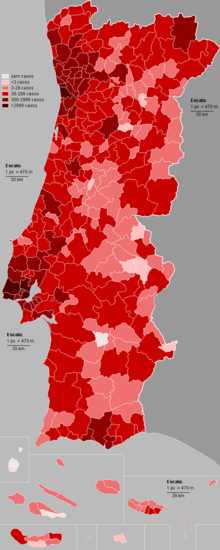COVID-19 pandemic in Portugal
| COVID-19 pandemic in Portugal | |||||||||||
|---|---|---|---|---|---|---|---|---|---|---|---|

Map of municipalities with coronavirus cases (as of 29 April 2020):[1]
| |||||||||||
| Disease | COVID-19 | ||||||||||
| Virus strain | SARS-CoV-2 | ||||||||||
| Location | Portugal | ||||||||||
| First outbreak | Wuhan, Hubei, China | ||||||||||
| Index case | Porto | ||||||||||
| Arrival date | 2 March 2020 (2 months and 4 days) | ||||||||||
| Confirmed cases | 26,182[1] | ||||||||||
| Suspected cases‡ | 262,041[1] | ||||||||||
| Severe cases | 136[1] | ||||||||||
| Hospitalized cases | 838[1] | ||||||||||
| Recovered | 2,076[1] | ||||||||||
Deaths
| 1,089[1] | ||||||||||
| Official website | |||||||||||
| covid19 | |||||||||||
| ‡Suspected cases have not been confirmed as being due to this strain by laboratory tests, although some other strains may have been ruled out. | |||||||||||
The ongoing COVID-19 pandemic was confirmed to have reached Portugal in March 2020 by the Directorate-General of Health (DGS).[2]
Background[edit]
On 12 January 2020, the World Health Organization (WHO) confirmed that a novel coronavirus was the cause of a respiratory illness in a cluster of people in Wuhan City, Hubei Province, China, which was reported to the WHO on 31 December 2019.[3][4]
The case fatality ratio for COVID-19 has been much lower than SARS of 2003,[5][6] but the transmission has been significantly greater, with a significant total death toll.[7][5]
Alert level[edit]
On 12th March 2020, the Portuguese government declared the highest level of alert because of COVID-19 and will maintain it until 9 April.[8] Portugal enters a Mitigation Phase as Community Transmission is detected and there is a need to implement harsher measures.[citation needed]
On 18th March, the President of the Republic, Marcelo Rebelo de Sousa, declared the entirety of the Portuguese territory in a State of Emergency for the following fifteen days, with the possibility of renewal, the first since the Carnation Revolution in 1974.[9]
On 24th March, the Portuguese Government admitted that the country could not contain COVID-19 any more, as it is widespread, and, on 26 March, the country entered the Mitigation Stage. The health care sites dedicated to fight the disease started including the Portugal Health centres groups (agrupamentos de centros de saúde, ACES).[10]
On 2nd April, the Parliament approved[11] the extension of the State of Emergency, requested by the President.[12] The State of Emergency will remain until 17 April, subject to further extensions of similar duration. Under the new regulations, for the Easter celebrations, from 9 April (Maundy Thursday) to 13 April (Easter Monday) the Portuguese Government decreed special measures in restricting people movements between municipalities (Portuguese: municípios or concelhos) with very few exceptions, closing all airports to civil transportation and increased control in the national borders.[citation needed]
On 30th of April, the Portuguese Minister's Council approved a plan to start releasing the country from the COVID-19 container measures and cancel the Emergency State. [13] The plan was divided in three stages (dates): 4th of May, 18th of May and 1st of June.
On 2nd of May the Emergency State was canceled.
On 4th of May Portugal started the first phase in easing the restrictions[14]:
- Barbers and hair salons are open but with health restrictions and appointments;
- Small shops with less than 200m2 can open but cannot have more than 5 clients/100m2 and all should use masks;
- People can use the public transportation if remote work cannot be achieved. Can only be filled until 2/3 and all passengers must use a mask;
- All public services are open to everyone with an appointment and is an obligation the use of a mask;
- Physical exercise only in the outdoor;
- Libraries and Archives are open;
- Cannot have more than 10 people together.
Information[edit]
Information about COVID-19 is hosted on the DGS home site. But because of the increasing severity of the pandemic a separate site was created dedicated to coronavirus information under the Portuguese Ministry of Health.[15] Another governmental website was later created, to deal with more generic information explaining the emergency status, public information and exceptional measures to help business.[16]
The Ministry of Health provides a web page with information for the public about different areas,[17] including brochures, orientation and guidance for different activity sectors, how to deal with self-isolation, and quarantine games for children. As an example there are several Portuguese food recipes with canned food.[18]
No comments:
Post a Comment
Note: Only a member of this blog may post a comment.